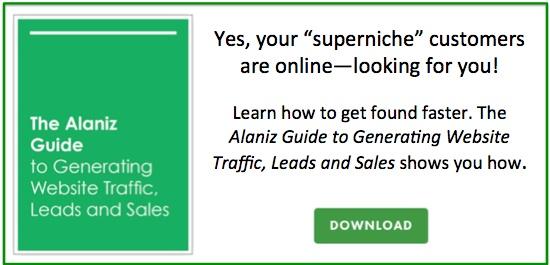 “People don’t shop for our products online.”
“People don’t shop for our products online.”
I can’t tell you how many times I’ve been told this by sales and marketing leaders at B2B companies that make obscure, highly complex technology and products. They tend to resist inbound marketing and lead generation because they don’t make “click to buy” products. Most have expensive custom products with long sales cycles and apply to a very narrow customer base. They figure few people are searching online for their products, so they don’t try too hard to attract them. I call them “superniche” companies.
My superniche education began when working for a company that made a product called a femtosecond laser for manufacturing very small parts. A femtosecond laser pulses light every quadrillionth of a second, more or less–so fast that it can make very tiny parts with extreme precision–think holes the width of a human hair.
It’s a very sciency product in a highly specialized industry. They cost around around a million dollars and it takes a couple of years to sell one. Superniche.
“People don’t shop for this online”
I was told at the start. Wrong. Well, not quite wrong. Sure, they don’t buy a million dollar laser online but, as we know, everyone researches online before contacting a supplier–even for exotic lasers as soon learned. If a company has a viable product that solves a problem, people are looking for it. There might not be that many searchers, but that can be a very good thing.
Here are 8 reasons we’ve found that inbound marketing works great for highly specialized B2B companies.
1) There is less competition for search terms
One of the keys to successful inbound marketing is optimizing content around the search terms your ideal customers use to look for help with the problem you solve. You want to find keywords with high volume and low competition; meaning there are a good number of people using these terms to search for solutions, and it won’t be terribly difficult to rank high in the search engine results.
Well guess what? As a superniche company, you are not likely to face much competition at all for the search terms you want to rank for. Believe me, it wasn’t difficult to rank high for “femtosecond lasers for manufacturing.” This means you can rank on page one, in most cases almost immediately, by optimizing web pages and publishing content around the search terms in your business.
2) You get immediate gratification
While there aren’t a lot of people searching for obscure keywords, those that are searching for, say, femtosecond lasers for manufacturing, are likely to be seriously interested. They aren’t searching for an obscure technology just to amuse themselves.
This means that in addition to ranking higher, faster, the company can get qualified leads faster, too. When we started a blog on femtosecond laser technology, and started offering educational whitepapers, our web traffic tripled and our contact database grew 6x in just three months through whitepaper downloads.
3) Big value
While the search volume and target audience may be small, customer acquisition in these industries tends to be very valuable. The products are expensive, and tend to involve long term commitments and relationships. A new customer represents a lot of revenue, both immediate and future.
4) Education works wonders
One of the principles of inbound marketing is that you should educate and inform, not sell. This tactic works very well in industries that involve sophisticated technology and services. Novices and veteran workers are motivated to stay up-to-date on new developments in their fields.
We created a blog for a company that excels at creating hermetic seals for implantable medical devices. You guessed it, superniche. Not only did their web traffic double in a few months after starting the blog, we got loads of comments thanking us for providing a new forum on the topic.
5) Your competitors aren’t doing it
The mentality that “people don’t shop for this online” is still pervasive in many fields that are highly specialized. You can tell by a survey of the competition. I’ve worked for a number of medical device contract manufacturers.
Many websites in this field haven’t been updated in decades. They are not publishing new content, have few calls to action for lead generation or nurturing, and simply aren’t investing in inbound marketing because they don’t think it applies to them. This means if a niche company runs an inbound lead generation and nurturing program, they’ll get leads that their competitors won’t.
6) It rewards quality
One of the most common questions we get from companies is
“How can you write about our technology if you’re not from this industry?”.
Their concern is a good one, because the more specialized the industry is, the more important it is to create content that is credible and valuable. You have to do your homework in order to understand what the issues are in the business, and how to bring new information and insights to bear on these issues through web pages, blogs, whitepapers, case studies and other materials.
People in these industries can detect “marketingspeak” very quickly, and will call it out. At the same time, quality content will be read and shared. A professor asked to use a whitepaper we wrote on packaging and sterilization for medical devices in his graduate course on medical device manufacturing, giving our client a huge source of traffic and leads.
7) You have more content than you think
We’ve found that companies with very sophisticated products and services have a lot of content on hand that they are not using. Some employees may have published papers at trade conferences, or they’ve given workshops or presentations to customers or internal groups. Training documents for new employees often contain a great deal of educational information about the industry they are joining.
One company we work with that makes very specialized manufacturing equipment has RFPs and sales quotations that have rich descriptions of the features and benefits of their products, complete with illustrations–great starting material.
8) R-E-S-P-E-C-T
Inbound marketing is all about respecting your customers, engaging them as they search for solutions to their problems, and offering them helpful information instead of interruptive sales pitches. We’ve found that this respectful way of marketing works exceptionally well in superniche businesses, as these industries tend to distrust traditional marketing tactics.
Companies making sophisticated products are typically staffed with sophisticated employees. You’re not going to trick them into considering or buying something they don’t want or need. Creating materials for people that are respectful of their knowledge and their needs will be rewarded.
They’re looking for you now
I think a challenge for superniche companies is that they tend to think that no one will ever find them in the vast reaches of the internet, so they give up. They don’t realize how good search engines have become at helping people find just what they are looking for, and that they are not competing with thousands of other companies for consumers’ eyeballs.
As I pointed out, if a company has a good product, one that solves a real problem, people are looking for it online. It can be even better if not that many people are looking for it, because that translates to less competition for search terms and fewer frivolous searchers, which gets companies found by the right people, faster.
Get in the game
If your company has been sitting on the sidelines of the Internet, assuming that your potential customers aren’t searching for and researching your solutions, it’s time to get in the game. The good news is that the tools you can use to optimize your website for search, publish helpful content to your target audience, make it easy for them to ask for more information and stay in touch, have gotten easier and easier to implement and use. Inbound marketing platforms make it nearly a point and click experience to get started, with automation tools that turn your website into a 24 hour sales person, fielding inquiries, qualifying leads, distributing information and updating your human sales team.
Here’s an ebook we put together to help you get started: How to Build an Inbound Marketing Campaign for Your Superniche Company.
![]()


